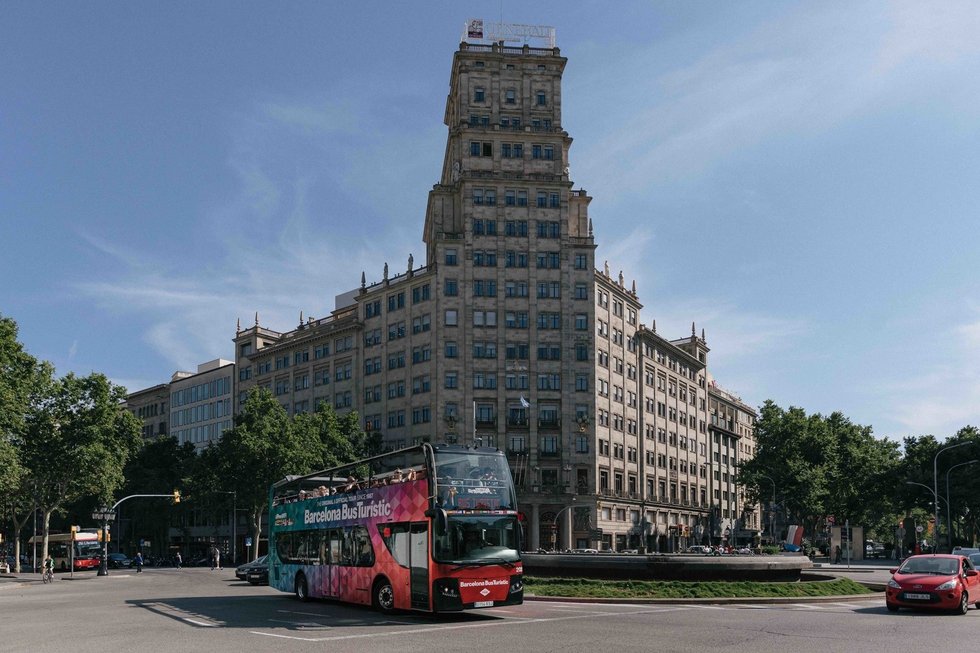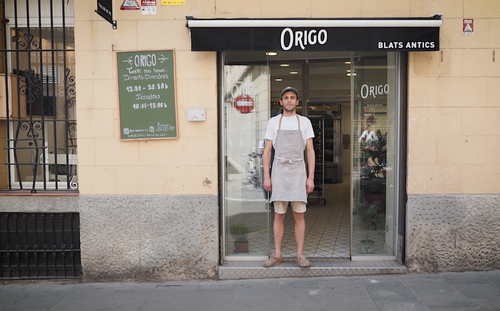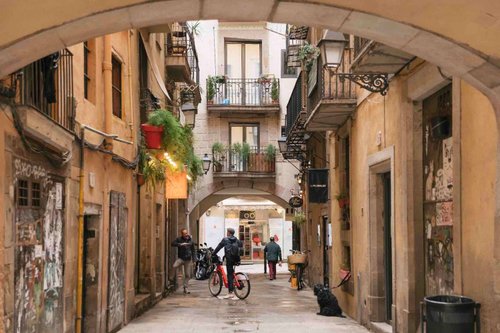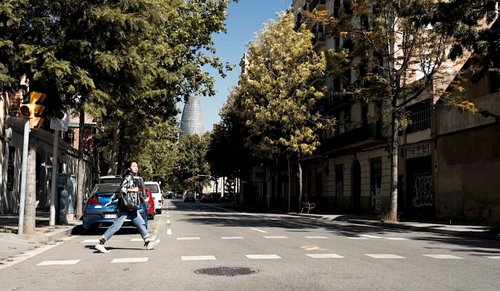Working in Tourism in Barcelona Opens Doors to the World
13 nov. 2019
6min


I’m an American expat who has been in Spain for 7 years while teaching English, writing and traveling.
The tourism industry is a driving force behind Spain’s economy, especially in Catalonia. It should come as no surprise that tens of millions of visitors flock to Barcelona every year to immerse themselves in the Mediterranean lifestyle, if only for a short trip. Due to this influx, more and more positions become available in the tourism industry in Barcelona each year. So here’s why now is the perfect time to snag a job in this hot field in this remarkable city.
What’s Been Happening
Catalonia
The tourism industry in Catalonia accounts for 12% of the region’s GDP, it already being an area that’s home to more than 22% of Spain’s tourist accommodation, says Catalonia.com. It’s easy to see what brings visitors in from around the world. The region’s Mediterranean climate, combined with sun-soaked beaches, beautiful art and architecture, and unique cultural identity make it an ideal spot for travelers, in particular those aged between 25 and 34 years old, studies show.
Barcelona
In terms of number of visitors and spending on international tourism, Barcelona was ranked the sixth city in Europe, and 17th in the world, in Mastercard’s 2018 Global Destination Cities Index. And according to the most recent figures from Statista.com, the number of tourists staying overnight in hotels in Barcelona annually has reached 9 million, while 47.3 million people are passing through the city’s airport, and another 2.7 million passengers are boarding cruise ships at the port. In all, it’s estimated that more than 30 million tourists make a stop in Barcelona itself every year. All of this activity is creating a world of possibilities when it comes to working in travel and tourism—workers are always needed to make sure that the ports and airports run smoothly, the hotels are sufficiently staffed to receive a high volume of guests, and tourism-based pursuits can be satisfactorily sustained once the visitors have arrived and unpacked.
It’s estimated that more than 30 million tourists make a stop in Barcelona itself every year.
A study carried out by Barcelona Oberta in 2017 produced many interesting findings. It showed that more than 60% of sales in the city’s most touristy zones, such as Plaça Catalunya, Portal de l’Àngel, Passeig de Gràcia, and El Born, were made to tourists. Tourism-review.com reported further on this study, stating that this equates to 18% of Barcelona’s total revenue in the commercial sector. Tourism brings in €2bn annually, which in turn keeps the city running and provides numerous jobs in these zones.
Many of these jobs, such as working in boutiques, shops, bars, and restaurants, are filled by expats who can speak multiple languages and who are new to these careers and settling into life in the city. Some come to Barcelona without arranging work ahead of time, and if they have prior experience and language skills, they don’t find it too difficult to pick up a position that is tourism-oriented.

Where it’s at
In Barcelona, in terms of accommodation, many hostels, hotels, and vacation rentals are concentrated in the most touristic zones of the city, such as El Born, Ciutat Vella, L’Eixample, Gràcia, and Sant Antoni. This is also where many of the city’s top restaurants and eateries are located, since they are ideal for bringing in a steady flow of business.
Gabriel Jené Llabrés, the president of Barcelona Oberta, stated, “Tourist purchases should be used as a lever to shift toward development in the city of new urban centers geared toward tourism in Barcelona and commerce.” Areas being suggested for redevelopment using this revenue included Gran Vía and Diagonal, with the hope that this would in turn create up to 6,000 new jobs in Barcelona.
Areas being suggested for redevelopment using this revenue included Gran Vía and Diagonal, with the hope that this would in turn create up to 6,000 new jobs in Barcelona.
Of course, most tourists visiting the region head to Barcelona, but there are many other areas of interest that attract tourism. The Costa Brava, especially during the summer months, is a top beach-holiday destination for travelers from all over Europe: In July and August, the coast comes to life as the population of its normally sleepy towns swell. In the winter, skiers and snowboarders head to the Pyrenees to enjoy the crisp snow and beautiful, natural surroundings.
Other notable hot spots for tourists in Catalonia include Montserrat, PortAventura, and the region’s many picturesque villages.
What to Expect
There are three main areas of activity within the tourism sector in Barcelona: Tourism planning, management, and marketing; restaurant services; and accommodation.
Positions
Because of the industry’s growth, jobs that are always available in this sector include hotel staff, working as a tour guide, or working in restaurants and bars, and they’re especially easy to pick up for people just starting out in the industry or beginning their career. Additionally, many career paths stem from tourism, particularly when it comes to marketing. Many companies require marketing managers, as well as content creators and ad execs to promote their products and services. Copywriters, community managers, and graphic designers are also important to companies working within the sector to help with branding, web presence, and publicity. Roles like these, which require more experience or training, as well as language skills, drive, and determination, are perfect for expats looking to relocate to Barcelona.
The roles that require more experience or training, as well as language skills, drive, and determination, are perfect for expats.
For candidates with more training or experience, there’s a wider variety of jobs up for the taking, such as in travel consultancy, while customer-service, front-desk, and management positions are frequently sought after in the hospitality side of the industry, which can cover shops, restaurants, and hotels that cater to tourists.

Required skills
If you want to work in tourism, here are a few ways to stand out as a candidate.
Languages: A knowledge of languages, especially English, is a must. Some vacancies may require the applicant to produce an official certificate that states their level of English if it’s not their first language. Naturally, the more languages one knows, the better the chances of landing the target position. Other useful ones to know include German, French, and Italian, due to the volume of tourists that come to Barcelona from these countries. If you know Chinese or Arabic, that will also be a boost for your résumé, as these are among the most widely spoken languages in the world. Of course, knowledge of or proficiency in Spanish and/or Catalan is also likely to be helpful, but working in tourism offers the unique advantage that English is highly regarded due to it being an international language spoken by employees all over the world. Barbara Tagliaferro, a local resident, has been working in tourism in Barcelona for several years and says, “The fact that this sector is bilingual makes it more challenging for a non-native, but also interesting.”
Qualifications: Another thing some jobs may require is a degree in tourism or related studies. However, there are programs run by organizations such as the Barcelona Guide Bureau, which offers official tour-guide certification and other training courses for those looking to beef up their skills in the industry.
Salaries
While tourism is experiencing a high point in Barcelona, it doesn’t necessarily mean that the salaries are. They vary widely in this sector, depending on the role and the qualifications and experience held. According to Glassdoor, a front-desk receptionist at a hotel, for example, can count on earning €20,000 a year on average, while Salaryexplorer.com says that an entry-level travel agent can start out earning about €1,400 monthly, and can look forward to significant pay increases over time and with experience. The good thing about this industry is the opportunity for growth and promotion.
The good thing about this industry is the opportunity for growth and promotion.
It’s also worth noting that many jobs, such as that of a tour guide, copywriter, or promoter, may require the worker to be able to issue an invoice. These positions are most often freelance positions and require you to register as autónomo, or self-employed. This means the worker will not have a fixed monthly salary or hours and will have to pay a monthly contribution on top of that, in addition to applicable taxes. It’s important to find out ahead of time if an employer can offer you a contract or requires you to go down the autónomo route. The latter does mean a worker can take on as much work as they see fit, and have more control over their earnings. Contracted positions have a fixed amount of hours or a schedule, with less flexibility, but offer the comfort of a consistent salary.

They’ve been there
While wages in Barcelona, and Spain as a whole, are lower when compared to what’s available in other countries in western Europe, that’s usually not what brings people to the Catalan capital. What attracts them is the unbeatable quality of life. Su-Ming Jaw is a marketing manager for Olala Homes, a vacation-home rental company with offices in Barcelona. She chose this city for exactly that: “The work/life balance is better, and you always get to work with people from all over the world. I love the walk back home from work every day, and enjoy how the streets look—the trees and changing colors of the flowers, the architecture, and children playing with their families.”
Yana Elmanovich has been working in tourism in Barcelona since 1992 and has been watching it flourish. “Barcelona’s tourism has grown since the 1992 Olympic Games, but the highest increase has been during the past five years, so there is still a lot to discover,” she says. “The difference between working in other cities is that you can reach almost all the touristic highlights on foot and enjoy the walk, no matter the distance.”
The Takeaway
A career in the tourism sector in Barcelona is an opportunity to grow and succeed. Candidates gain skills along the way and learn how to work in international environments and interact with people from all over the globe. Paired with the option to live in an incredible city where the residents know how to balance work with life, it offers an experience that just can’t be beat!

Inspirez-vous davantage sur : Work in Barcelona
Moving to Barcelona for work? Navigate the job jungle in this international hub with our insider tips, advice from locals and insights from industry experts.

Work in Barcelona: François
Originally from Belgium, he left his job at Google in San Francisco to move to Barcelona with his wife, where he decided to open his own bakery.
11 déc. 2019

Work in Barcelona
Considering relocating to Barcelona? Let’s have a look behind the scenes to understand what it takes to be a happy expat in Barcelona.
11 déc. 2019

Work in Barcelona: Amy
Born and raised in Canada, Amy moved to Barcelona to change career by retraining as a software developer. Here's her expat experience of the city.
11 déc. 2019

My Barcelona: ‘The city is so much richer than it seems’
For Anaïs, Barcelona is such an enticing city that she has made it her home not once, but twice.
13 nov. 2019

My Barcelona: ‘It’s the Silicon Valley of Europe’
Frenchman Erwan Riou originally qualified as an architect, but after a stint in Brazil, the 33-year-old started retraining as a programmer...
13 nov. 2019
La newsletter qui fait le taf
Envie de ne louper aucun de nos articles ? Une fois par semaine, des histoires, des jobs et des conseils dans votre boite mail.

Vous êtes à la recherche d’une nouvelle opportunité ?
Plus de 200 000 candidats ont trouvé un emploi sur Welcome to the Jungle.
Explorer les jobs